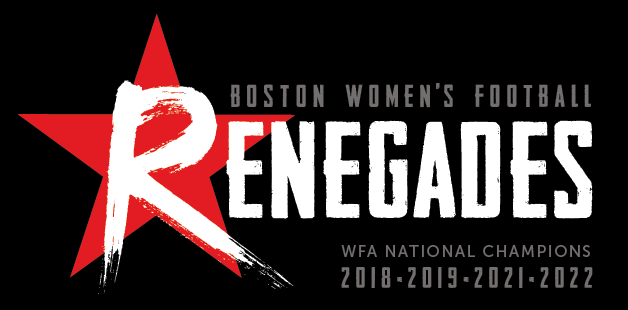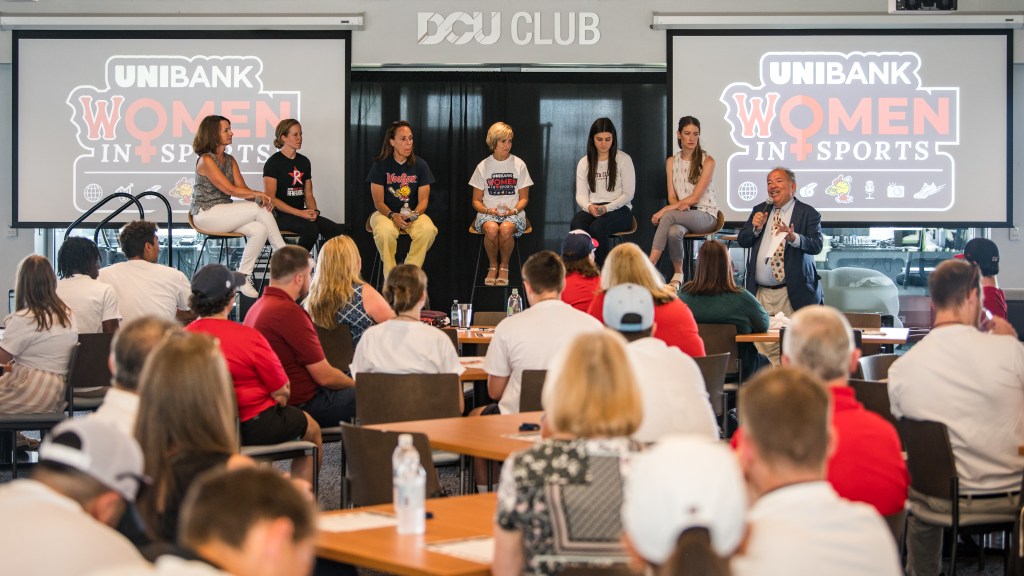Panel includes boston Renegades Quarterback Allison Cahill
By Liza Armstrong, Minor League Baseball
The Worcester Red Sox hosted their inaugural “Unibank Women in Sports Day” on Saturday, July 24. The day included a panel featuring local prominent women in sports and multiple pre-game and in-game recognitions of women in sports.
Panelists included longtime Telegram and Gazette reporter Jen Toland; Boston Renegades quarterback Allison Cahill; Assumption University Professor and Director of Sports Management Libby O’Hara; Seven Hills Foundation Vice President of Advancement and former NESN producer, Kate Myshrall; former captain of the Santa Clara University varsity rowing team, Katie Wickstrom; and WooSox Executive Vice President and General Counsel Kim Miner. The panel was moderated by WooSox President Dr. Charles Steinberg and focused on how the women found their way into the sports world and how they’ve dealt with and overcome adversity and other issues that they have face in the workplace.
Toland spoke first and focused on how she entered sports journalism, and how she has seen multiple advances that have equaled the playing field for women. Unlike today, when Toland began her career, female reporters were not allowed in locker rooms or on the sidelines. She also reiterated that even when she was little, she would see the few female sports reporters and think, “Why can’t I be in that position.” She hopes that she is an inspiration for aspiring female reporters, as others were for her.
Cahill, [seven]-time national champion quarterback for the Boston Renegades of the Women’s Football Alliance, added to Toland’s remarks about female representation with a focus on professional athletics. Cahill did play football when she was younger, even participating in Pop Warner football, but she temporarily stopped once she reached high school. Instead, she became a basketball star and went on to play collegiately at Princeton.
“I understood the reality of my options,” Cahill said. “I think I saw basketball as a path to getting into a good college. I just didn’t know about any women tackle football leagues.”
Cahill also touched on the demands of being a professional women’s football player and the struggles of encouraging other women to play—two of the biggest being the lack of a female high school and college pipeline for the sport, and that the athletes are currently unpaid.
“You’re putting your body in harm’s way two to three times a week, and you have to turn around and go to work on Monday,” Cahill said. “Not every job and not every family member is supportive of that risk-to-reward calculator.”
Lastly, Cahill remarked that working in a coaching or management position in the NFL post-retirement is becoming “more and more of a realistic path” once your playing days are over.
“The NFL is doing a better job of trying to be more inclusive for women and minorities, and you see that playing out.” Cahill remarked. “It’s cool to turn on the TV and see a woman who you played against now standing on the sidelines and winning the Super Bowl, in the case of [assistant defensive line coach] Lori Locust down in Tampa Bay.”
O’Hara focused on her experience at Madison Square Garden and offered advice for girls who aspire to work in the sports field.
“Just outwork everyone, and outshine everyone,” O’Hara said. “Don’t be the last one to come in. Be the first one there; be the last one to leave.”
O’Hara, who worked at the Garden during its Isiah Thomas years, also explained that as a woman working in sports, or in any industry, you need to know that “there’s a pivot point where you decide enough is enough, and you need to stand up and be heard.”
Myshrall, one of the early producers at NESN who helped make the network what it is today, said that one of the reasons she took the job was because “there were no women doing production, and I wanted to do production [and] pave the way.”
“There were no other women producing baseball at that time, even when we went to NBC Sports,” Myshrall added. “None of the top producers, directors, or coordinating producers were women. I felt very fortunate to be [at NESN] and draw on the people around me.”
She also talked about a woman who helped her break into the industry: Dr. Mimi Murray, a professor at Springfield College who was one of the key people in the passage of Title IX and a former broadcaster on ABC’s “Wide World of Sports” and NBC’s “Sportsworld.” Murray helped Myshrall get her foot through the door by giving her an internship at NBC Sports.
Wickstrom discussed her experience as a Division I athlete at Santa Clara University, where she worked her way up to captain of the varsity team. When she joined the team her sophomore year, it helped her gain confidence and find a support group, even though she was 3,000 miles from home. Even as a retired athlete now, her driven mindset benefits her in her professional life as an accountant.
Miner was the last one to speak. Like O’Hara, Miner spent much of her time giving advice to the aspiring female sports professionals in attendance.
“Don’t give yourself too long to question your qualifications, because a lot of our peers don’t do that, and you just go for it,” Miner said.
Miner also explained how she has grown into herself from the start of her time at the organization to the present.
“For a while, I tried to act a certain way to garner more respect and would speak a certain way so that maybe I sounded older or more like my male colleagues,” Miner said. “I did start swearing more when I came to work in baseball, and that was not intentional. But it was awful, because it did actually get people to pay attention a little bit. It’s funny how you kind of notice you mimic what other people are doing to gain respect and to be heard, and I don’t always think that’s a good thing. I think having women in leadership positions means you see less of that because you can see that there are different leadership styles. You can see that someone can look different and act different and sound different and still be absolutely qualified to be where they are.”
The panel concluded with a Q&A portion when panelists advised the men in attendance on what they can do to help improve the current and future environment for their counterparts.
“Be an ally,” Cahill said. “Hopefully you’ll never be a perpetrator, but you will likely be a bystander to at least a comment. You don’t have to go around with a women’s symbol on your shirt or anything like that, just speak up. Speak quietly, speak strongly, speak firmly.”
“We should all be mindful [that as a woman] you have to think about so many things,” Miner said. “The numbers are tough. There aren’t a lot of jobs, but on top of that, you’re thinking, am I walking into a toxic workplace? Am I the only woman? Do I have any women who I can look up to? Am I gonna be asked an uncomfortable question? Am I gonna be asked to take notes at every meeting ‘cause I’m a woman? You are already thinking about that, so I think it’s important that we all acknowledge that part of being a woman in sports is just showing up. I hope that changes. I hope that men call each other out. That is going to make the change. The women shouldn’t have to do this on their own, nor should they.”
Finally, the panelists highlighted the work that the WooSox organization has done for current and aspiring women sports professionals.
“Look at this organization,” O’Hara said. “Look at all the women who are powerhouses. The world is changing.”

